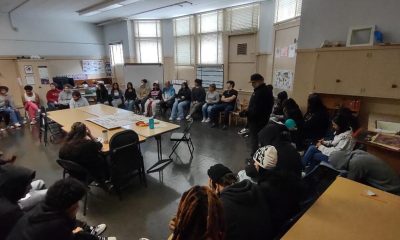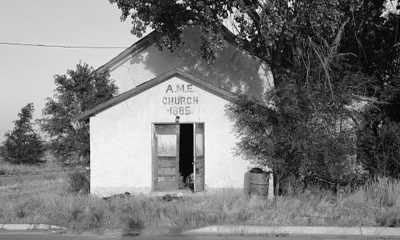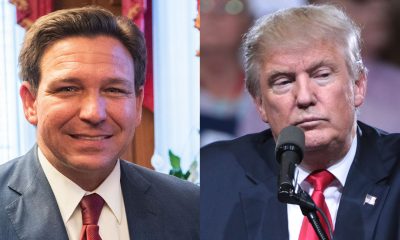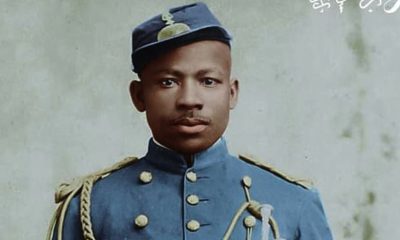World
Dissidents Free But Questions Hang Over US-Cuba Deal

In this April 9, 2013 file photo, military guards stand in a room decorated with an image of revolutionary hero Ernesto “Che” Guevara outside prison cells at the Combinado del Este prison during a media tour in Havana, Cuba. (AP Photo/Franklin Reyes, File)
ANDREA RODRIGUEZ, Associated Press
MICHAEL WEISSENSTEIN, Associated Press
HAVANA (AP) — At least five dissidents were free Thursday in what a leading human rights advocate said was part of Cuba’s deal with Washington to release 53 members of the island’s political opposition.
Neither the Obama administration nor the Cuban government spoke publicly about the releases, adding to the unanswered questions swirling around the deal and the broader detente that the two countries announced Dec. 17.
President Barack Obama ended five decades of official U.S. hostility toward communist-governed Cuba by announcing that, along with an exchange of men held on espionage charges, he would move toward full diplomatic ties, drop regime change as a U.S. goal and use his executive authority to punch holes in the longstanding trade embargo.
His Cuban counterpart, Raul Castro, welcomed the announcement but said detente would not lead Cuba to change its single-party political system or centrally planned economy.
U.S. officials told reporters on Dec. 17 that Cuba had agreed to free the 53 detainees, considered by Washington to be high-priority political prisoners. Castro said they would be released in “a unilateral way.” But since then, neither Cuba nor the United States has publicly identified anyone on the list or announced they have gone free.
Facing criticism at home, U.S. officials said they never expected Cuba to move immediately to release the prisoners. They said the U.S. was avoiding public complaints that could provoke a backlash from Cuban officials.
For many Cuban-Americans and U.S. conservatives, the apparent lack of movement supported complaints that Obama’s secretly negotiated deal was too opaque and had failed to win sufficient concessions from Cuba.
“It’s unfair for us Cubans and Cuban-Americans not to be able to influence this situation that has such a tremendous relevance for the future of Cuba,” said Francisco “Pepe” Hernandez, president of the Cuban American National Foundation.
On Wednesday, the head of Cuba’s Human Rights and Reconciliation Commission, Elizardo Sanchez, told The Associated Press that 19-year-old twins Diango Vargas Martin and Bianko Vargas Martin had been released without any of the judicial procedures that normally precede the end of political cases. A few hours later, he said a third dissident, Enrique Figuerola Miranda, was let go under similar circumstances.
On Thursday morning, he said that prisoners Ernesto Riveri Gascon and Lazaro Romero Hurtado had also been released.
Sanchez said he believed the releases were the start of a wider liberation of political prisoners. If he is right, the criticism of the prisoner deal could quickly lose momentum.
But clarity about the fate of the prisoners would answer only one of the questions still hanging over the U.S.-Cuba deal worked out by small teams of negotiators behind closed doors over the 18 months leading up to the announcement.
Relatives of Rolando Sarraff Trujillo, a U.S. spy released under last month’s deal, say they are puzzled about why they have yet to hear from him. And Cubans are wondering why former President Fidel Castro has said nothing in public more than three weeks after the announcement.
All five men were members of the Patriotic Union of Cuba, a small dissident group considered to be the country’s most vehemently anti-government.
According to Amnesty International, the twins were arrested in December 2012 as they tried to return to their home in Santiago, where they lived with their mother, a member of the dissident group Ladies in White. They had been held on charges of using violence or intimidation against a state official.
“They’re prisoners of conscience and they’ve been freed immediately and with no conditions,” Sanchez said. Riveri and Romero were arrested in the same incident.
The twins’ mother, Miraida Martin, said her sons had been told they were being transferred to another facility but once outside the prison in far eastern Cuba they were suddenly set free without explanation.
“We think they’re on the list, but nothing’s been said about it,” she said.
Hernandez, of the Cuban American National Foundation, said he had been informed by the White House that Lady in White member Sonia Garro, her husband and a neighbor had been let go as part of the deal prior to both governments’ announcement of warming relations.
___
Andrea Rodriguez on Twitter: https://twitter.com/ARodriguezAP
Michael Weissenstein on Twitter: https://twitter.com/mweissenstein
Copyright 2015 The Associated Press. All rights reserved. This material may not be published, broadcast, rewritten or redistributed.
Black History
Biden acknowledged America’s ‘Original Sin of Slavery,’ Pledged Infrastructure Dollars and Long-Term Financial Aid
“Our people lie at the heart of a deep and profound connection that forever binds Africa and the United States together. We remember the stolen men and women and children who were brought to our shores in chains and subjected to unimaginable cruelty,” Biden said in remarks at the National Museum of Slavery, which is built near the chapel where enslaved individuals were forcibly baptized before being sent to America. The museum was built on the property of Álvaro de Carvalho Matoso, one of the largest slave traders on the African coast.
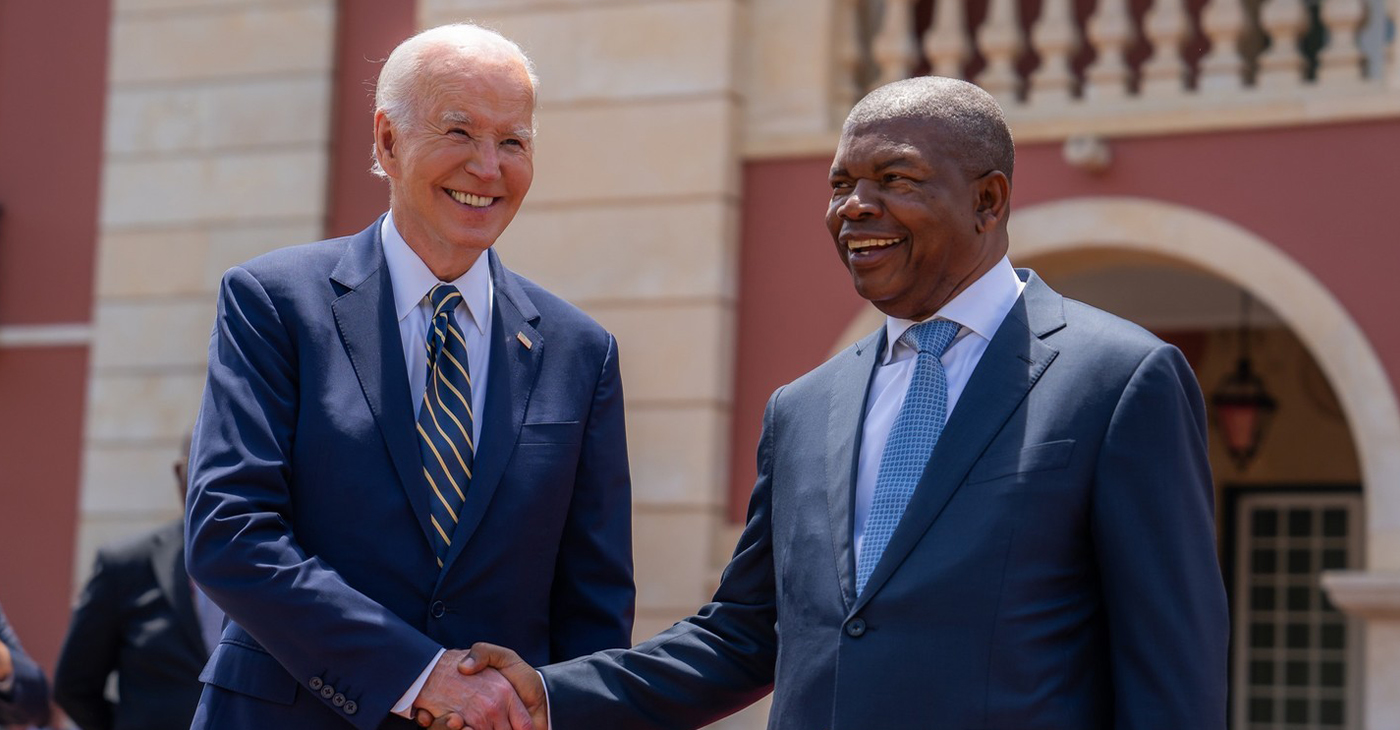
Will Biden’s aid for an above-the-ground Railroad help ease the pain for the African Americans’ Underground Railroad?
By Post Staff
And news dispatches from the Guardian, CNN and AP
When President Joe Biden went to Angola this week the purpose was ostensibly to advance the Lobito Corridor, an unfinished 800-mile railway project meant to facilitate the transfer of critical minerals from interior countries to western ports for exports.
But in a visit to the country’s slave museum, he acknowledged America’s dark past and its connection to Angola in the presence of three descendants of the first captives who arrived in Virginia from Angola in 1619.
The child of two of those captives — Antony and Isabella — was William Tucker, born around 1623. Three of his descendants were present when Biden spoke at the country’s slave museum and humbly acknowledged how the horrific history of slavery has connected the United States and Angola.
“While history can be hidden, it cannot and should not be erased. It should be faced. It’s our duty to face our history,” he said. “The good, the bad and the ugly. The whole truth. That’s what great nations do,” he said.
“It was the beginning of slavery in the United States. Cruel. Brutal. Dehumanizing. Our nation’s original sin. Original sin. One that’s haunted America and cast a long shadow ever since,” Biden spoke as he honored the Tucker family.
After introducing Wanda Tucker, Vincent Tucker and Carlita Tucker, he delivered a hopeful vision for the future in a major speech from the country that was the point of departure for millions of enslaved Africans.
(Wanda Tucker now serves as the faculty chair of psychology, philosophy and religious studies at Rio Salado College in Arizona.)
“Our people lie at the heart of a deep and profound connection that forever binds Africa and the United States together. We remember the stolen men and women and children who were brought to our shores in chains and subjected to unimaginable cruelty,” Biden said in remarks at the National Museum of Slavery, which is built near the chapel where enslaved individuals were forcibly baptized before being sent to America.
The museum was built on the property of Álvaro de Carvalho Matoso, one of the largest slave traders on the African coast.
Biden told the attendees that he’s proud to be the first president to visit Angola and that he’s “deeply optimistic” about the future relationship between the nation and the US.
“The story of Angola and the United States holds a lesson for the world. Two nations with a shared history, an evil of human bondage,” Biden said. “Two nations on the opposite sides of the Cold War, the defining struggle of the late part of the 20th century. And now, two nations standing shoulder to shoulder working together every day. It’s a reminder that no nation need be permanently the adversary of another.”
Biden’s trip aimed to highlight U.S. investments in Angola and the continent in the face of deepening Chinese influence in the region, as Beijing has poured hundreds of billions of dollars into Africa through its Belt and Road Initiative.
Biden took a swipe at China’s moves, without calling out the country by name, and argued the US presents a better alternative.
“The United States understands how we invest in Africa is as important as how much we invest,” Biden said.
“In too many places, 10 years after the so-called investment was made, workers are still coming home on a dirt road and without electricity, a village without a school, a city without a hospital, a country under crushing debt. We seek a better way, transparent, high standard, open access to investment that protects workers and the rule of law and the environment. It can be done and will be done,” the president said.
Biden’s speech comes during what likely could be his last trip abroad as president and as he seeks to deepen relationships with Angola and other African nations at a time when China has made significant inroads in the continent with hundreds of billions of dollars of infrastructure investments, far outpacing the U.S.
During his remarks, Biden touted U.S. efforts to expand its relationships across Africa, including billions of dollars in investments in Angola.
He also announced over $1 billion in new US humanitarian assistance for Africans who have been displaced by historic droughts across the continent.
“But we know African leaders and citizens are seeking more than just aid. You seek investment.
So, the United States is expanding its relationships all across Africa,” Biden said, adding later: “Moving from patrons to partners.”
Ahead of his remarks, the president also met with Angolan leaders, including young people at the museum.
Biden started his day with a bilateral meeting with Angolan President João Manuel Gonçalves Lourenço at the presidential palace in Luanda.
The two men discussed trade and infrastructure, including the US and Europe’s investment in the railroad. They also discussed mutual security interests as Angola has played a key mediating role in the conflict in the eastern Democratic Republic of the Congo.
In November, Angola announced their Incremental Production Decree of fiscal terms designed to enhance the commercial viability of developing oil and gas fields. The decree enhances the commercial viability of developing fields in mature blocks, underexplored areas and stranded resources, while encouraging exploration near existing infrastructure. The US Railroad infrastructure investments could play a major role in enabling increased recovery from producing fields and extending the lifespan of critical infrastructure, the decree is set to generate billions in offshore investments, create jobs and drive economic growth, solidifying Angola’s position as a leading oil and gas producer.
Activism
South African Solidarity Committee Hosts 31st Annual Celebration
“We’re all together for each other celebrating 31 years of building international solidarity between the people of the United States and South Africa toward the implementation of the 1955 Freedom Charter and 2030 Sustainable Development Goals,” said COSAS Operations Manager Nicole Richards.Located in Berkeley, COSAS is dedicated to the continuing struggle by the people of South Africa’s need for independence.
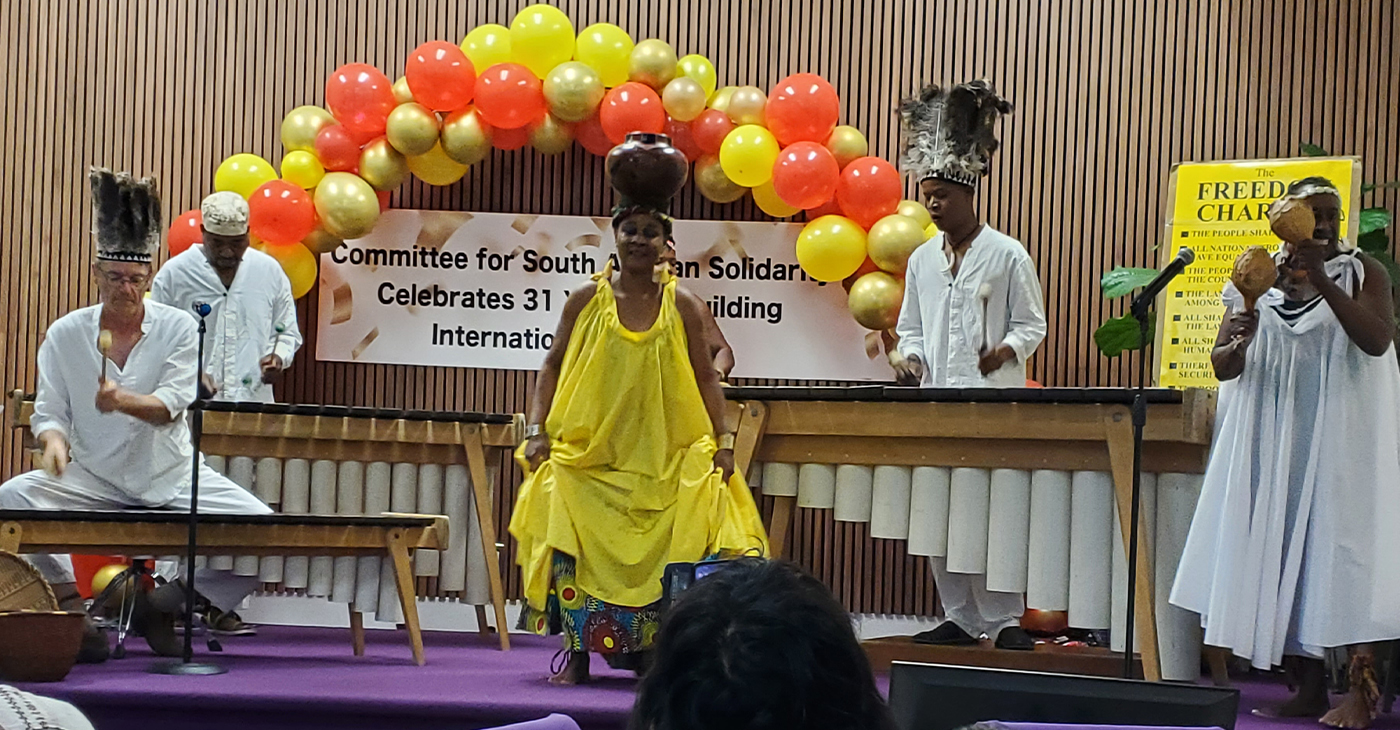
By Carla Thomas
The Committee of South African Solidarity (COSAS) celebrated its 31st anniversary on Saturday, Oct. 26 at the East Bay Church of Religious Science in Oakland.
Themed “Ubuntu,” a word in Zulu and Xhosa, which means “I am because we are,” the event brought together supporters and community members.
“We’re all together for each other celebrating 31 years of building international solidarity between the people of the United States and South Africa toward the implementation of the 1955 Freedom Charter and 2030 Sustainable Development Goals,” said COSAS Operations Manager Nicole Richards.
Located in Berkeley, COSAS is dedicated to the continuing struggle by the people of South Africa’s need for independence.
A soulful meal was prepared by Chef Rene Johnson and Blackberry Soul Catering along with live entertainment and speakers.
COSAS is an all-volunteer, private membership organization, made up of South Africans, Africans, students, professionals, clergy and others committed to building solidarity between the working people of the U.S. and the South African people still struggling for economic and political freedom.
Formed in 1993, the organization promotes the “real nature” of the changes and struggles taking place in South Africa and the African continent, according to Richards.
“COSAS counters ‘disinformation’ and ‘misinformation’ in the U.S. and Western mainstream media that creates division and distrust,” Richards said. “We produce the South African Beacon and organize and transport solidarity shipments of school supplies to South African grade schools requesting assistance,” Richards said.
According to organizers, COSAS is completely run by volunteers, free from the corporate and government agendas that continue to keep South Africa dependent on the West.
“We rely on the support of concerned individuals. Call us today about how you can get involved by sorting and packing supplies, donating office equipment, and supporting special events,” said Richards.
Earlier in the year, COSAS hosted its World Affairs film showing at Downs Memorial United Methodist Church. The screening featured a short film, “Feeding a Crisis: Africa’s Manufactured Hunger Pandemic,” exploring the hunger challenges African countries face and approaches to resolving the issues.
Contact the Committee for South African Solidarity, 1837 Alcatraz Ave., Berkeley, CA, 510-251-0998 for volunteer opportunities and event information.
Community
How Mobihealth Drives a Telemedicine Revolution in Africa
As a child growing up in northern Nigeria, Dr. Funmi Adewara experienced a severe hand injury that required multiple surgeries and frequent hospital visits. These visits exposed her to the harsh realities of the country’s healthcare system. “I remember sitting in overcrowded waiting rooms, watching doctors stretched thin, unable to meet the needs of so many patients,” Adewara recalls. This formative experience ignited her passion for transforming healthcare in Africa.

By Ifeanyi Abraham
CNN
As a child growing up in northern Nigeria, Dr. Funmi Adewara experienced a severe hand injury that required multiple surgeries and frequent hospital visits.
These visits exposed her to the harsh realities of the country’s healthcare system. “I remember sitting in overcrowded waiting rooms, watching doctors stretched thin, unable to meet the needs of so many patients,” Adewara recalls.
This formative experience ignited her passion for transforming healthcare in Africa.
Growing up with a mother who worked as a nurse, Adewara’s understanding of healthcare challenges deepened through her mother’s stories.
“I knew early on that healthcare wasn’t a privilege — it was a necessity, and I wanted to be part of changing the system,” she explains.
After training as a physician, Adewara worked for 15 years in the United Kingdom’s National Health Service before founding the telemedicine platform Mobihealth in 2017.
Since its launch, Mobihealth has impacted thousands of lives, connecting patients with doctors and healthcare professionals across Nigeria and beyond.
The platform has 20 integrated telehealth clinics that offer remote consultations, diagnostics, and access to specialist care via digital health tools. Located primarily in Nigeria, these clinics are accessible to patients through various subscription plans and are often financed through partnerships with global donor organizations and private donors.
In addition to the clinics, Mobihealth has partnerships with over 200 hospitals, labs, and pharmacies, Adewara says.
The company has earned global recognition, including a $1 million grant from the U.S. Trade and Development Agency in 2022. Adewara was also one of the World Bank’s seven 2020 Sustainable Development Goals & Her award winners, selected from over 2,400 entries worldwide.
Connecting Rural Patients
Across sub-Saharan Africa, millions struggle to access basic healthcare. According to the World Health Organization, the region bears 25% of the global disease burden but has only 3% of the world’s healthcare workers.
“In rural Africa, a trip to the nearest hospital can mean the difference between life and death,” says Adewara.
Mobihealth’s latest initiative offers healthcare for $1 a month for rural and underserved populations. It allows Africans in the diaspora — and global supporters — to sponsor essential services like doctor consultations, diagnostic tests, and access to telemedicine clinics.
The scheme is not solely based on donations; individuals can also subscribe to the service for themselves.
“Healthcare systems across Africa are under immense pressure,” Adewara explains. “Our initiative is a direct response, using technology to connect rural patients with doctors thousands of miles away.”
For Adewara, Mobihealth’s telemedicine platform is not a temporary fix; it represents the future of healthcare in Africa.
“This is about creating a resilient, sustainable and inclusive system, where people, no matter where they are, can access the care they need,” she says.
“Telemedicine brings doctors to people, wherever they may be. By integrating AI and remote monitoring, we are improving the speed and accuracy of care, saving lives in the process,” she adds.
A number of African companies provide telemedicine services, but researchers have pointed out that there are obstacles that could hinder the growth of telemedicine in the continent.
Rural areas can have an unreliable electricity supply and poor internet connectivity, and there is often a lack of government policies and funding around virtual healthcare.
“A Healthcare System for the Future”
Adewara envisions scaling her company’s model to reach millions more across Africa, particularly in countries like Ghana, Kenya, and Ivory Coast.
“Our work is just beginning,” she says. “We are building a healthcare system for the future — one that is resilient, inclusive and capable of meeting Africa’s growing population’s needs.”
However, partnerships are crucial to achieving this vision. “We can’t do this alone. Our collaborations with the African diaspora, hospitals, governments, and international organizations allow us to reach more people and ensure that healthcare is affordable, efficient and accessible,” Adewara adds.
-

 California Black Media4 weeks ago
California Black Media4 weeks agoCalifornia to Offer $43.7 Million in Federal Grants to Combat Hate Crimes
-

 Black History4 weeks ago
Black History4 weeks agoEmeline King: A Trailblazer in the Automotive Industry
-

 California Black Media4 weeks ago
California Black Media4 weeks agoGov. Newsom Goes to Washington to Advocate for California Priorities
-

 California Black Media4 weeks ago
California Black Media4 weeks agoCalifornia Department of Aging Offers Free Resources for Family Caregivers in November
-

 Activism3 weeks ago
Activism3 weeks agoOakland Post: Week of November 27 – December 3, 2024
-

 Activism4 weeks ago
Activism4 weeks agoOCCUR Hosts “Faith Forward” Conference in Oakland
-

 Activism4 weeks ago
Activism4 weeks agoRichmond Seniors Still Having a Ball After 25 Years
-

 Activism2 weeks ago
Activism2 weeks agoButler, Lee Celebrate Passage of Bill to Honor Congresswoman Shirley Chisholm with Congressional Gold Medal





